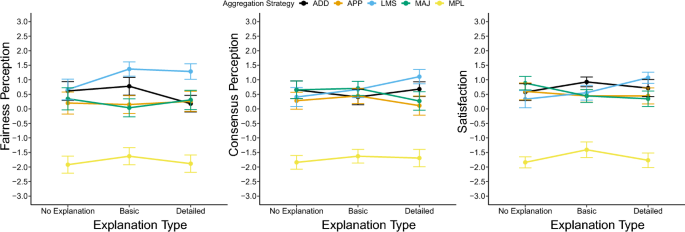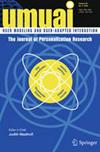Evaluating explainable social choice-based aggregation strategies for group recommendation
IF 3.5
3区 计算机科学
Q2 COMPUTER SCIENCE, CYBERNETICS
引用次数: 0
Abstract
Abstract Social choice aggregation strategies have been proposed as an explainable way to generate recommendations to groups of users. However, it is not trivial to determine the best strategy to apply for a specific group. Previous work highlighted that the performance of a group recommender system is affected by the internal diversity of the group members’ preferences. However, few of them have empirically evaluated how the specific distribution of preferences in a group determines which strategy is the most effective. Furthermore, only a few studies evaluated the impact of providing explanations for the recommendations generated with social choice aggregation strategies, by evaluating explanations and aggregation strategies in a coupled way. To fill these gaps, we present two user studies ( N =399 and N =288) examining the effectiveness of social choice aggregation strategies in terms of users’ fairness perception, consensus perception, and satisfaction. We study the impact of the level of (dis-)agreement within the group on the performance of these strategies. Furthermore, we investigate the added value of textual explanations of the underlying social choice aggregation strategy used to generate the recommendation. The results of both user studies show no benefits in using social choice-based explanations for group recommendations. However, we find significant differences in the effectiveness of the social choice-based aggregation strategies in both studies. Furthermore, the specific group configuration (i.e., various scenarios of internal diversity) seems to determine the most effective aggregation strategy. These results provide useful insights on how to select the appropriate aggregation strategy for a specific group based on the level of (dis-)agreement within the group members’ preferences.

评估群体推荐中基于可解释社会选择的聚合策略
摘要社会选择聚合策略是一种可解释的向用户群体生成推荐的方法。然而,确定适用于特定群体的最佳策略并非易事。先前的研究强调了群体推荐系统的性能受到群体成员偏好的内部多样性的影响。然而,他们中很少有人经验性地评估群体中偏好的具体分布如何决定哪种策略最有效。此外,只有少数研究通过耦合评估解释和聚合策略来评估为社会选择聚合策略产生的建议提供解释的影响。为了填补这些空白,我们提出了两项用户研究(N =399和N =288),从用户公平感知、共识感知和满意度的角度检验了社会选择聚合策略的有效性。我们研究了群体内部的(不)一致程度对这些策略执行的影响。此外,我们还研究了用于生成推荐的潜在社会选择聚合策略的文本解释的附加价值。两项用户研究的结果都表明,在群体推荐中使用基于社会选择的解释没有任何好处。然而,我们发现两项研究中基于社会选择的聚合策略的有效性存在显著差异。此外,特定的群体配置(即内部多样性的各种场景)似乎决定了最有效的聚集策略。这些结果为如何根据群体成员偏好中的(不)一致程度为特定群体选择适当的聚合策略提供了有用的见解。
本文章由计算机程序翻译,如有差异,请以英文原文为准。
求助全文
约1分钟内获得全文
求助全文
来源期刊

User Modeling and User-Adapted Interaction
工程技术-计算机:控制论
CiteScore
8.90
自引率
8.30%
发文量
35
审稿时长
>12 weeks
期刊介绍:
User Modeling and User-Adapted Interaction provides an interdisciplinary forum for the dissemination of novel and significant original research results about interactive computer systems that can adapt themselves to their users, and on the design, use, and evaluation of user models for adaptation. The journal publishes high-quality original papers from, e.g., the following areas: acquisition and formal representation of user models; conceptual models and user stereotypes for personalization; student modeling and adaptive learning; models of groups of users; user model driven personalised information discovery and retrieval; recommender systems; adaptive user interfaces and agents; adaptation for accessibility and inclusion; generic user modeling systems and tools; interoperability of user models; personalization in areas such as; affective computing; ubiquitous and mobile computing; language based interactions; multi-modal interactions; virtual and augmented reality; social media and the Web; human-robot interaction; behaviour change interventions; personalized applications in specific domains; privacy, accountability, and security of information for personalization; responsible adaptation: fairness, accountability, explainability, transparency and control; methods for the design and evaluation of user models and adaptive systems
 求助内容:
求助内容: 应助结果提醒方式:
应助结果提醒方式:


